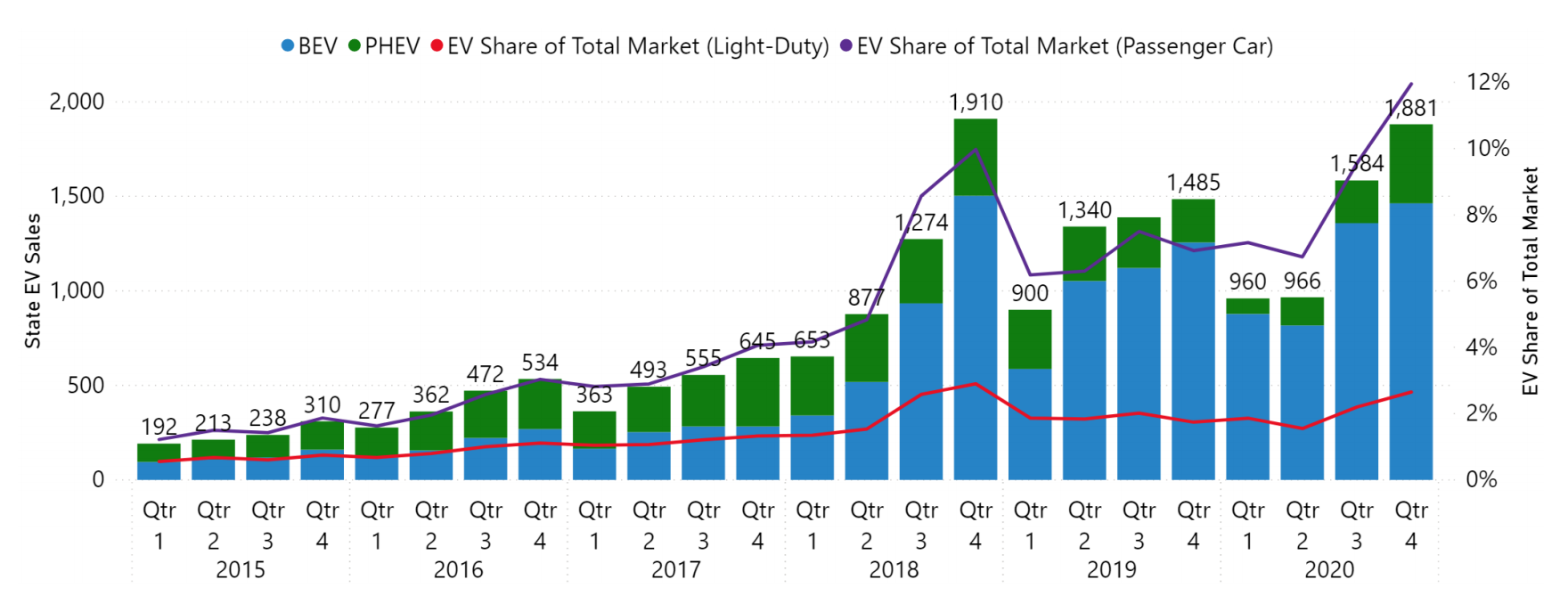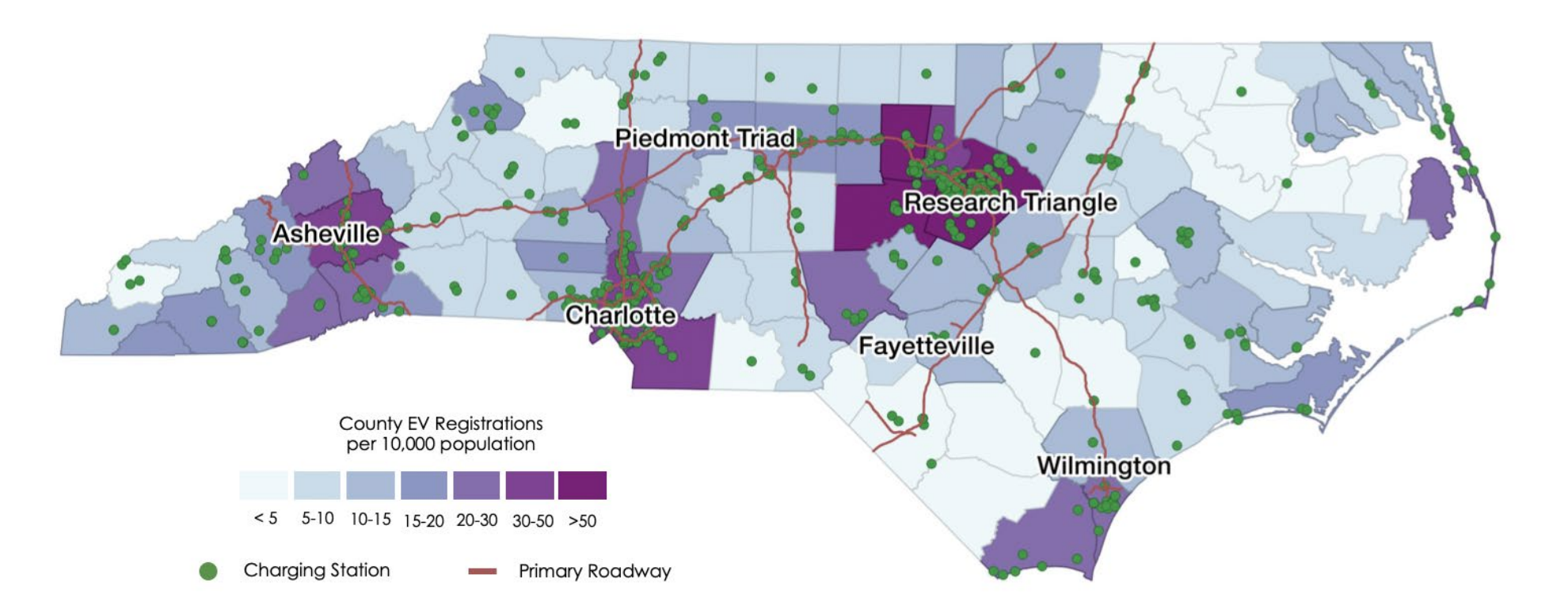The EV market is at an inflection point. Now is the moment to implement supportive public policies to get more electric cars, trucks, and buses on the road to reduce climate emissions, clean the air, enhance energy security, and spur economic development.
Stan Cross | March 1, 2021 | Clean Transportation, Electric Vehicles, North Carolina
The electric vehicle (EV) market is rapidly expanding:
- Over 60 new EV models are heading to showroom floors with prices falling and range increasing to an average of 286 miles per charge.
- $480 billion has been invested globally to electrify transportation, with approximately $96 billion coming to the U.S. to spur manufacturing and job growth.
- North Carolina currently ranks 17th nationally in EV sales and 14th in clean vehicle employment and is home to several EV manufacturers and supply chain companies.
- In Q3/Q4 of 2020, the EV share of total passenger car sales in North Carolina, excluding light-duty pickup trucks, reached beyond 10% for the first time.
EV sales and market share in North Carolina through 2020

States are seizing the opportunity to increase EVs’ share of vehicles on the road. To explore how North Carolina stacks up against other states in the region, the Southern Alliance for Clean Energy (SACE) and Atlas Public Policy have collaborated on a new brief, “Transportation Electrification in North Carolina.” The new brief follows the recent “Transportation Electrification in the Southeast” brief, also a collaboration between SACE and Atlas, which examined state policy and regulatory, economic development, and investment activity across the Southeast. The North Carolina-specific brief provides a snapshot of the state’s EV market, transportation patterns, policy environment, and opportunities to improve public health, meet climate change goals, and spur economic growth.
Download the Brief
Read the Blog Series
This blog post, the second in a series examining the study’s findings, highlights public policies that can work together to accelerate the EV market and provide all North Carolinians access to electric transportation’s economic, public health, and climate benefits.
EV Policy Priorities
Supporting EV market growth requires a mix of policy approaches. Though North Carolina is a leader in transportation electrification planning, it lags in policy implementation, which slows market growth. The brief explores the many policies the state could adopt and highlights implementation success in other states.
No one EV policy can spur the market alone. What’s needed is a combination of policies that address consumer access, create investment capital, and support market transitions while ensuring equitable and just implementation. The following are three examples of potentially impactful policies North Carolina could adopt to enable cleaner, more energy secure, and lower-cost electric transportation options for consumers and support the state’s growing EV manufacturing and supply chain companies.
(1) Consumer Access: consider adopting Section 177 clean air standards
Not every state is equal. Section 177 of the Clean Air Act permitted California to develop its own more stringent emissions standards. It also authorizes other states to choose to adopt California’s standards instead of federal requirements. So far, 13 states have adopted California’s standards, with Virginia’s legislature voting to become the 14th state last week with strong backing from businesses. Adoption is also under consideration by policymakers in Minnesota, New Mexico, and Nevada.
States that adopt Section 177 rules commit to aggressive passenger vehicle tailpipe emissions reduction. To comply with this regulation, automakers need to sell low- and zero-emission vehicles to balance emissions across their entire product offering. As a result, automakers prioritize EV inventory to Section 177 states, which make up over 30% of the nation’s new car market.
North Carolina is not currently a Section 177 state, which impacts the market; only 34 of the currently available 52 EV models are available for purchase in North Carolina. What is available is often in short supply. This issue will only become more problematic as more states adopt Section 177 standards pulling even more exciting, new longer-range EVs away from North Carolina.
(2) Investment Capital: consider joining the Transportation Climate Initiative
You can’t achieve what you can’t afford. Governor Cooper’s Executive Order 80 sets in motion the processes to reduce statewide greenhouse gas emissions to 40% below 2005 levels and increase the number of zero-emission vehicles to at least 80,000 by 2025. Achieving these goals requires capital investments.
The Transportation Climate Initiative (TCI) is a bi-partisan regional collaboration that seeks to improve transportation, develop the clean energy economy, and reduce carbon emissions from the transportation sector. The collaboration began in the Northeast and now engages states along the eastern seaboard from North Carolina to Vermont. At the center of TCI is a market-driven, carbon cap-and-invest strategy. The “cap” in cap-and-invest puts a price on carbon and leverages market dynamics to achieve guaranteed emissions reductions at relatively low cost for consumers and businesses. Joining TCI could generate upwards of $300M per year for North Carolina to fund transportation climate initiatives.
In December, Massachusetts, Connecticut, Rhode Island, and the District of Columbia signed the TCI MOU and became the first four participants in the TCI Program. Eight other states, including Delaware, Maryland, New Jersey, New York, North Carolina, Vermont, Pennsylvania, and Virginia, signed a statement of support and continued collaboration but did not sign the final MOU.
(3) Market Support: Consider Adopting the Advanced Clean Truck Rule
Firstly, despite making up only around 10% of the nation’s vehicles, medium, and heavy-duty trucks are responsible for 28% of carbon emissions from the transportation sector, 45% of on-road NOx emissions, and 57% of direct fine particulate. These vehicles are a climate problem and negatively impact public health, especially for frontline communities impacted first and worst by air pollution. The Advanced Clean Truck (ACT) will ensure more zero-emission trucks are available for sale by requiring truck manufacturers to produce an increasing percentage of zero-emission vehicles over time.
Today, on a total cost of ownership basis and without incentives, certain zero-emission trucks are cost-competitive if not less expensive than their fossil fuel counterparts. Most classes of vehicles are expected to achieve total cost of ownership parity by 2030. ACT will accelerate this transition.
Adopting ACT will support the Multi-State Medium and Heavy-Duty Zero Emission Vehicle MOU that Governor Cooper signed onto in 2020 and is good for business. North Carolina is home to several medium and heavy-duty EV-related businesses, including auto manufactures like Daimler’s Thomas Built Buses, Volvo North America (makers of Mack trucks), Freightliner trucks, and delivery van manufacturer Arrival, EV charging infrastructure companies like ABB and Siemens, and supply chain businesses like Eaton.
Implementation Matters
The implementation of EV policies must ensure equitable access to the benefits of electric transportation for all North Carolinians across racial, rural-urban, and economic divides. Policies and implementation need to move the market and confront transportation inequities and injustices. To achieve equitable access, representatives from traditionally overburdened and underserved communities need to have seats at the policy table to ensure the needs and opportunities of their communities are foundational to the discussions, not afterthoughts.
As seen in the graphic below, North Carolinians do not currently have equal access to EV ownership and EV charger deployment.
EV REGISTRATION DISTRIBUTION BY COUNTY IN NORTH CAROLINA THROUGH DECEMBER 2020

Given the urgency of addressing climate change by reducing greenhouse gas emissions and strengthening the state’s energy security by moving away from transportation dependency on imported gas and diesel, policy action is needed. Electrifying transportation is a viable and impactful means of achieving climate and energy security goals. If the right combination of policies is put in place in parallel, the additional economic development, and public health benefits will be maximized. And if implemented with equity and access prioritized, the benefits will extend to all.
UTILITY ENGAGEMENT MATTERS (PART 3 TEASER)
As more light, medium, and heavy-duty EVs displace gas and diesel vehicles, the energy that powers transportation shifts from petroleum to electricity. Strategic utility engagement to advance the EV market has proven to generate consumer, electric grid, and climate benefits. The third installment in this blog series will explore EV actions being taken in North Carolina by Duke Energy, the state’s electric member cooperatives, and municipal utilities, including highway corridor fast-charging, EV rebates, school bus electrification, vehicle-to-grid charging studies, and multi-unit dwelling charging programs. The third blog post will also explore national examples highlighted in the brief.
Download the Brief
Read the Blog Series
Electrify the South is a program of the Southern Alliance for Clean Energy that leverages research, advocacy, and outreach to promote renewable energy and accelerate the equitable transition to electric transportation throughout the Southeast. Visit ElectrifytheSouth.org to learn more and connect with us.
#EVsinNC
